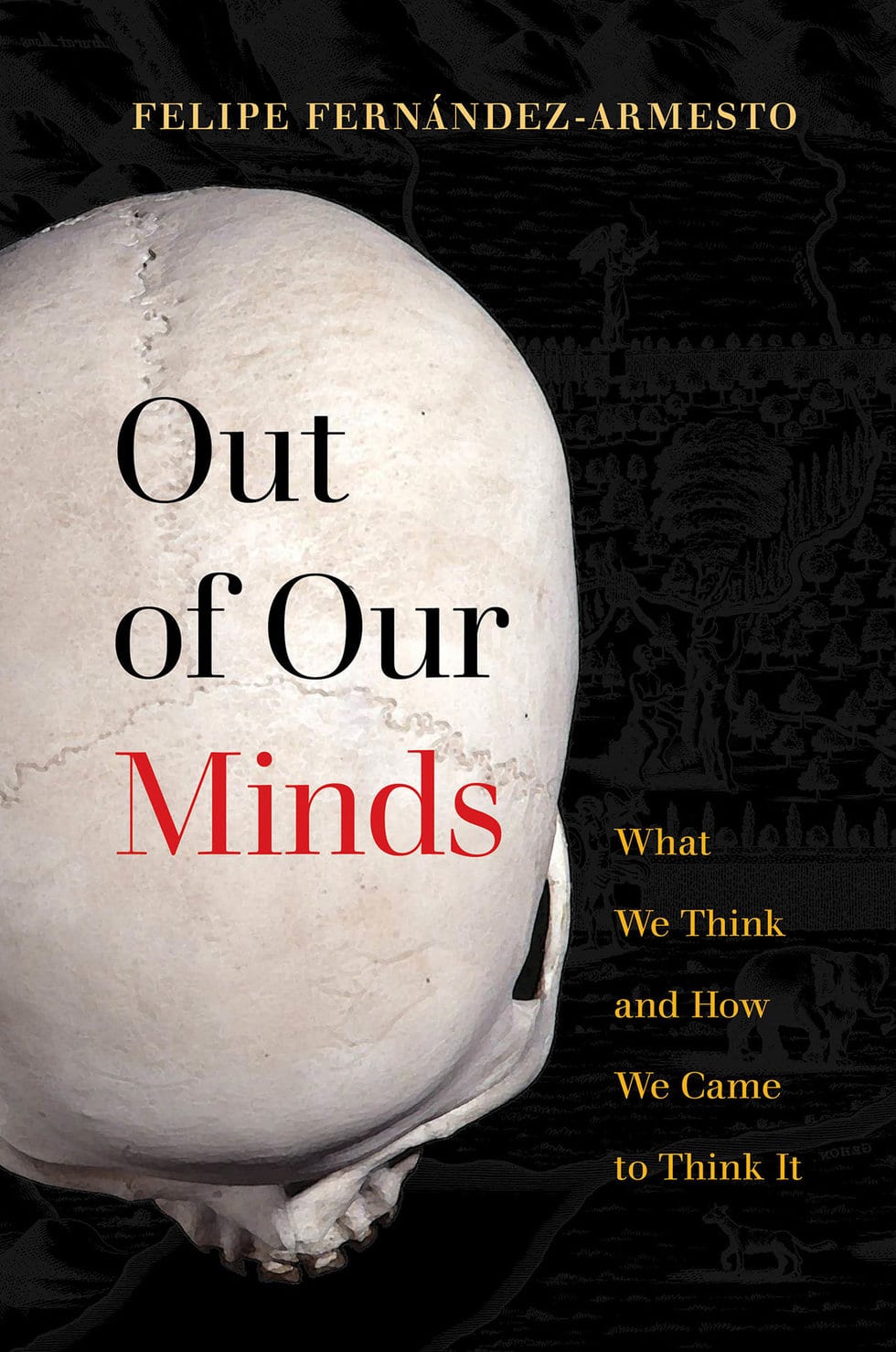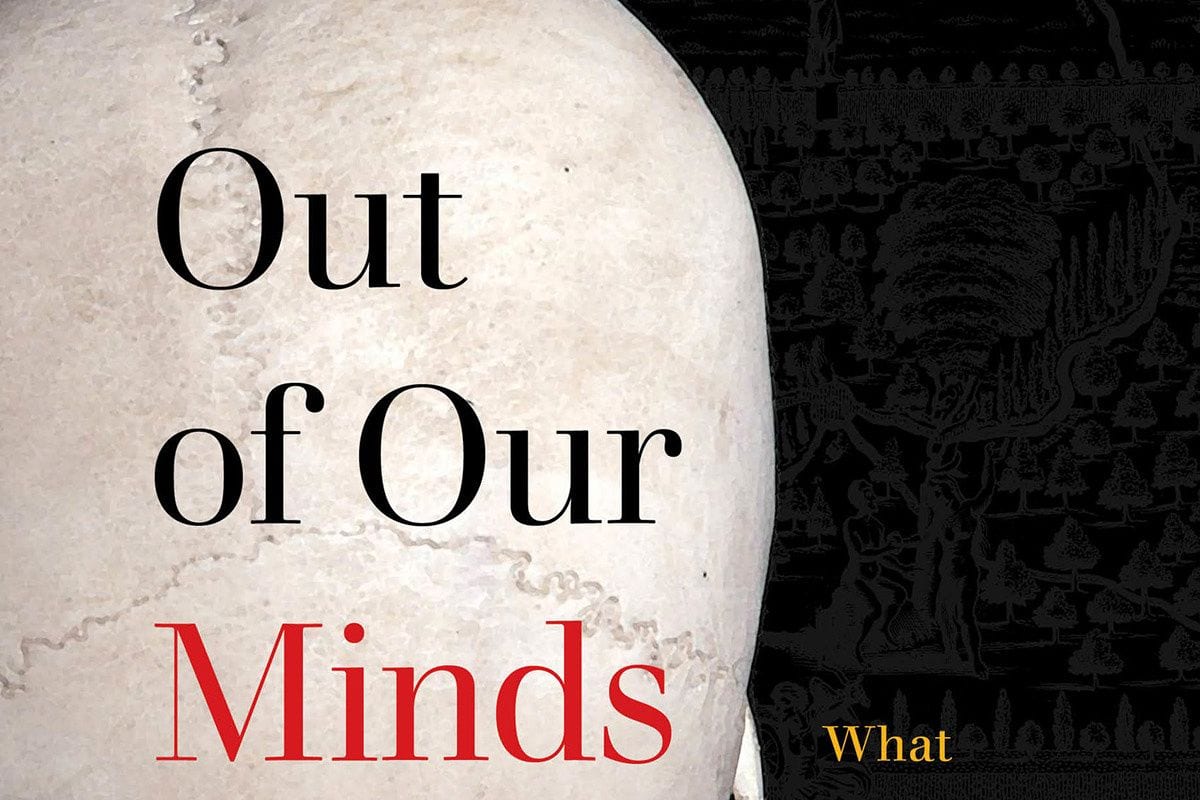
Curating the range of artifacts or the impact of events presents a challenge for any historian. Add to that the ephemeral quality and evanescent origins of thoughts and the task exponentially grows in difficulty, not least when a scholar’s theories must be translated into a narrative that is accessible outside the academy.
Luckily, Oxford-trained Felipe Fernández-Armesto has been telling lively tales of how the early modern era contributed to our own time for over 40 years. Beyond his specialty in the period of the conquest by the Spanish of the Americas, he has tackled the past thousand years, exploration across the globe, the legacies of what we eat and why, the Reformation, and an illustrated history of the world.
At first, Out of Our Minds: What We Think and How We Came to Think It may appear to be a rehash of bookmarked leftovers or a reheating of last decade’s academic tidbits. Yet, as this professor at Notre Dame explains in his preface, his newest publication expands the entries of a few hundred words each that appeared in Ideas That Changed the World (DK Publishing, 2003).
My highlighted passages average about one on every four of his nearly 500pages. Fernández-Armesto combines a knack for aphorism with a hunch for speculation. “Blend bad memory and good anticipation together: imagination results.” “If you want to know what people in the past thought, look at their art, even before you look at their writings, because their art literally pictures for us their world as they experienced it.” “Religion starts with scepticism—doubts about the unique reality of matter, or, to put it in today’s argot, about what whether what you see is what you get.” His prose sustains a reflective style. He rarely intersperses first-person intrusions, but his tone and gaze stay steady.
Beginning with the hazy arrival of humankind, he marvels how our fragile species “can hear a note and compose a symphony; see a stick and turn it mentally into a missile; survey a landscape and envision a city; taste bread and wine and sense the presence of God; count and leap to infinity and eternity; endure frustration and conceive perfection; look at his chains and fancy ourselves free.” Possessing suggestive imagination, humans may attribute teeming invention, ironically, to “some of our relative deficiencies of brainpower.” For, this lack of bioenergy fuels “what ifs” which generate ideas to stimulate thought.
Necessarily brisk, Fernández-Armesto must pace himself as he crams so much into relatively so small a space. He pivots from taboos about food and sex, fundamentals of materialism and “semblance”, into agriculture (“where crops are gods, farming is worship”), then to labor massed under tyranny. He conflates massacre with radical utopianism, shows how rulers concocted “elaborate justifications for making others toil”, and avers how “imperialism suited monism. A unified world would match the unity of the cosmos” for Mesopotamian and Egyptian civilizations. From the commencement of these systems on, “increasing leisure never liberates us. It makes work a chore and multiplies stress” in turn.
What some call today “faith-based communities” emerge, Fernández-Armesto suggests, in a novel fashion: “Demand for quick-fix manuals arose, as it still does, from competition between gurus.” Today’s “pop atheism misrepresents God as an infantile idea, but it took a lot of strenuous thinking to achieve it.” Given the author’s prior study of the split that led to Protestantism, he cautions those who attribute, on the other hand, too much importance to belief-systems. Most people ignore their deities, unless “spasms of conscience” remind them, or “when they want to justify what they propose to do anyway—typically, war, mayhem, and persecution.”
While never jaundiced or jaded, he does favor those among our ancestors who used their brains to get beyond the “default state of incurious minds” materialism. But tracing the flaws in human endeavor, he admits that the “idea that rulers’ education in philosophy will make them good is touching.” Plato may well have erred. “Every teacher is susceptible to similar hubris.” Freedom and force, coercion and custom, jostle dominance.
Turning to medieval chivalry, Fernández-Armesto nods that ethos trumps ideology in shaping behavior. Individuals gain standards “by which to adjust and appraise their actions.” Self-perception enriches actions, and rather than follow a dictate from above, the emerging society that sparked Columbus’s voyages took encouragement from printing, mercantile opportunity, and firepower. These achievements helped advance an ideal of nobility, which attracted those from the lower echelons, as a warrior elite found itself dismounted as horse and lance folded before cannon and gunpowder. Government commands via messengers with orders to territories that sprawled over vast distances. The Renaissance became the first worldwide intellectual movement in the history of ideas. Foodstuffs, spices, and precious metals traded, along with tilting the balance of power away from China as Christianity colluded with conquerors.
Still, such weaponized progress sparks dangerous explosions. This professor distrusts visionaries, who promise perfection. “They all want us to defer to fantasy father-figures who would surely make life wretched: guardians, proletarian dictators, intrusive computers, know-all theocrats, or paternalistic sages who do their thinking for you, overregulate your life, and crush or stretch you into comfortless conformity. Every utopia is an empire of Procrustes.” As with travel, the “search for an ideal society” is best conducted in the spirit of hope on the way forward, “because arrival breeds disillusionment.”
All the same, the Enlightenment flared up to illuminate tangible human fulfillment through scientific observation and empirical application. Romanticism followed, as intellectuals stepped back from cold reason towards temperate nature. What remained still lingers as the “American dream”: as if progress can enhance lives and capitalism harnessed will enable the masses to attain prosperity.
By the Victorian era, this relentless optimism curdled. Warfare on a massive scale would soon consume much of the planet, as the imperial armies summoned their troops from native and colonial ranks alike. Nationalism, violence, racism, the cult of the State, and “the sufficiency of science” all bear much blame. Neither the overthrow of the rich, predicted as inevitable under communism, nor the “grandeur and grind at the heart of socialism: noble humanity, mobilized by dreary determinism”, could supplant the damages of capitalism and corporate domination witnessed today as nearly all peoples bow to profit.
Dubious credit to Hegel lies at the heart of this ideological shift. He “adopted a strategy unlikely to communicate yet calculated to impress: he made his thought hard to follow and his language hard to understand.” Fernández-Armesto knows his colleagues. “Would-be intellectuals often overrate obscurity and even exalt unintelligibility. We all feel tempted to mistake complexity for profundity.”
It’s a testament to the care with which Out of Our Minds has been composed that, as Fernández-Armesto edges into our tumultuous era of Brexit, Trump, Catalonian unrest and Venezuelan implosion, he remains collected and measured in his judgments. He evokes twin “heresies” of the Lone Ranger thundering in to save the day and Donald Duck whose fulminations lead to trouble as American flaws. He bravely attempts to tie relativity to relativism to account for the last century’s unravelling. He judges Freudian thinking as having helped millions and tortured millions. Our “feel-good society” boasts dubious progenitors, and in aesthetics, philosophy, therapy, policy, and university, the vision of “an ill-ordered, uncontrollable world, composed of poorly-fitted fragments” reifies the atomic theory’s model.
Against “the politics of the megaphone,” Fernández-Armesto surveys the fragile gap within which we live. Technology relied upon also delivers evil. People’s “moral incapacity to resist it” traps us in an ugly world. Sociobiology, postmodernism, and fundamentalism undermine our dignity and weaken our sanity. Opposing a lemming-like rush to despair, this scholar concludes by suggesting pluralism as paradoxically “the one doctrine that can unite us.” How long cherished diversity resists the imperious convergence of a monoculture remains to be seen, or feared. For conformity silences our imaginations.

